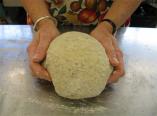Gorgeous springtime weather here in the UK, which has earned it after a sodden couple of months. Last weekend it hit 17c on Sunday which brought all the picnickers out in force. Primrose Hill was littered with everyone and his dog, and the market at Camden Lock was seething. It’s not the market that was during my day, but I was pleased to see a few things have endured, like Marine Ices and Belgo Noord. But the market itself – once a jumble of knick-knacks, housewares, jewelery, and oddities with a bit of food – has become one big street food extravaganza with little else on offer. If you’re hungry and willing to eat and run, it’s the place to be on a weekend. But otherwise, other markets.
I’ve managed to arrive in time to attend some of the free lectures on offer at Kings College London in its Feed Your Mind series. I went to the well-attended first session, Obese London, to learn about obesity rates and their consequences for Londoners. These are highest among immigrant populations, whose diet plummets away from traditional foods into heavy consumption of the worst foods (chips, sugary drinks, chocolate, sweets and processed foods) the longer they’ve been in the country. And of course these deliver obesity and its associated chronic illnesses including diabetes, hypertension, cardiovascular disease and higher mortality.
Yesterday I headed to KCL’s Guy’s Campus, in the shadow of the Shard, and arrived as the Tuesday farmers market was underway. The afternoon’s entertainment was called Hot & Spicy Drugs, which focused somewhat disappointingly and pretty much exclusively on capsaicin (the heat in chilli peppers) and its possible uses in pharmacology. I’d been hoping for a bit more talk about more of the hot & spicy foods and their uses both traditional and pharmacological, but I learned some interesting things. Birds lack the receptor protein that gives chillies their heat; drugs that block this receptor in humans have been developed but are not used since they also block our ability to feel external heat, which seems a pretty undesirable side effect. Applied topically, capsaicin (after an introductory period of discomfort) has a desensitizing effect which can help a lot of kinds of neuralgia and neuropathy. Capsaicin creams and patches have been found to be helpful in relieving pain associated with arthritis, shingles, psoriasis and a number of other conditions. And we got to do a taste test with randomly assigned chocolates with different amounts of chilli in them; as might have been expected, the perception of heat varied wildly among tasters.
Tomorrow I’m off to hear the creator of meat from stem cells, Professor Mark Post of Maastricht University, extoll the virtues of stemburgers. Yum.















